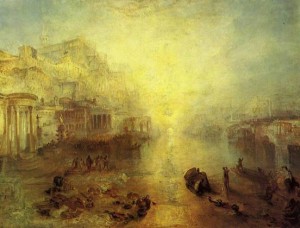Imbolc Valentine Moon
After the Swede saw, lunch and a nap followed by another sentence, 6 verses long, in Ovid’s retelling of the Jason and Medea narrative. When I have a week off from translating, or almost a week, like I had when I spent time rearranging and reorganizing, I wonder if I can still do it. Sometimes I convince myself that what I’ve learned has dropped away and I’ve wasted all the time up to that point. Silly, yes, but real nonetheless.
(Medea, Batumi, Georgia)
As a result, it is a relief when I return to the work and find myself able to translate. This time in fact I managed a translation of a clause without looking up a word. Something is seeping into the lower crevices of my brain. Language work, at least for me, is slog, slog, slog, plateau. Plateau, plateau, plateau. Slog, slog, slog, slog. Plateau. So on.
Right now I’m gaining facility at recognizing words and verb forms and sussing out  grammatical forms, though I’m wrong as often as I’m right. That’s without Perseus (the online classics web engine), without Anderson (the scholarly commentator on Ovid) and without Wheelock (the grammar text). There’s the plateau.
grammatical forms, though I’m wrong as often as I’m right. That’s without Perseus (the online classics web engine), without Anderson (the scholarly commentator on Ovid) and without Wheelock (the grammar text). There’s the plateau.
I can only advance part way into the text without the books. With the books now I increase my facility by maybe another 25%. So a lot of the time I can translate the literal sense of Latin correctly, but at least a quarter of the time, I’m lost. That’s where my tutor comes into play.
(Ovid, Constanta, Romania, 2012)
He unsticks me from my stuck places and has been invaluable as a role model for tactics and strategy when approaching unfamiliar text. He also guided me through the initial learning phase, about two years, when the grammar and vocabulary were still largely alien (foreign) to me.
My personal goal is to be 90 to 95% successful on my own by the end of this year. Then, I imagine, I’ll use Greg (my tutor) less often and then as a backup. That’s unless we decide together to get back on the commentary track. That still sounds fun to me.

 The moment was extraordinary. What had been a fuzzy, blurred night sky became black velvet set with bright points of light.
The moment was extraordinary. What had been a fuzzy, blurred night sky became black velvet set with bright points of light.